PMC Research Hosts “InvigoratEU: Invigorating Enlargement and Neighbourhood Policy for a Resilient Europe” Project Conference
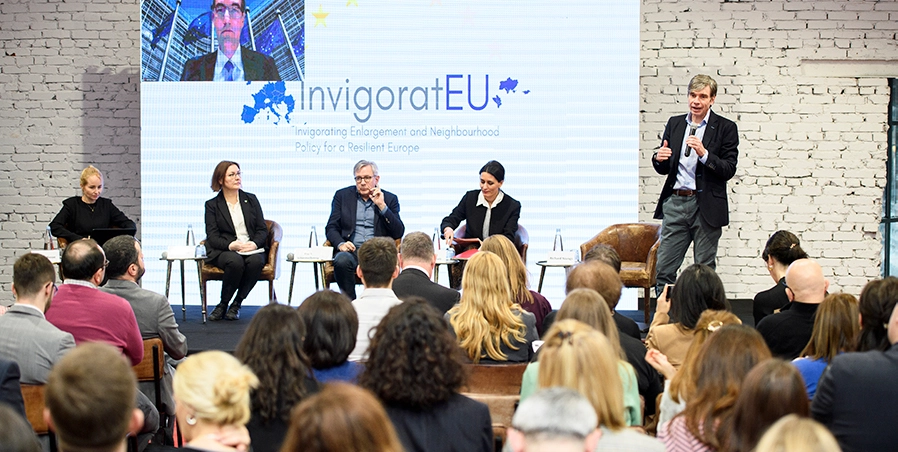
On 20-21 February, we hosted the “InvigoratEU: Invigorating Enlargement and Neighbourhood Policy for a Resilient Europe” project’s kick-off conference in Tbilisi, Georgia, bringing together 18 leading European research organizations, all of which are members of a consortium led by the University of Duisburg-Essen.“InvigoratEU,” a project coordinated by the EU-Chair at the University of Duisburg-Essen and the Institute of European Politics, sets out to explore how the EU ought to navigate its future relations with countries of the Eastern Partnership (EaP) and the Western Balkans.
Kick-off Conference – Sharing Visions and Panel Discussions
Day one of the conference began with welcome and opening remarks from host Dr. Giorgi Khishtovani (PMC Research as well as coordinator Prof. Dr. Michael Kaeding (University of Duisburg-Essen, Germany) and scientific lead Prof. Dr. Funda Tekin (Institute for European Politics (Germany)).
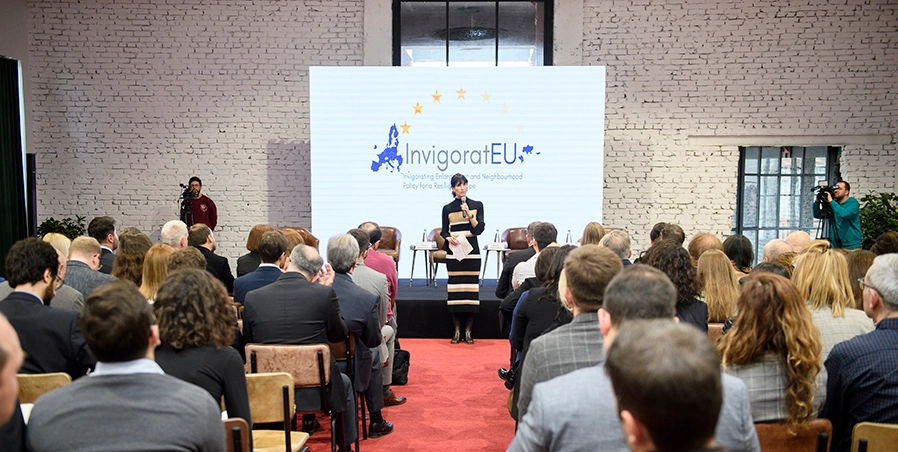
“The project has come at the right time. We need good answers on how to integrate the Western Balkans, Ukraine, Moldova, and Georgia into the EU to prepare Europe for the future. What makes InvigoratEU special is that it consists of a consortium that takes into account Europe’s diversity and political perspectives,” said Prof. Michael Kaeding (UDE EU-chair and coordinator of InvigoratEU),
Thereafter, Eugenia Strantza (Project Advisor at the Research Executive Agency at the European Commission) added further comments, while presenting information about the Research Executive Agency at the European Commission and details about the framework program for Research and Innovation Horizon Europe 2021-2027.
The remainder of the conference’s first day was devoted to the “InvigoratEU” project’s vision, work program, and timeframe, with every partner of the project consortium also presented to the attendees.
“I want to thank my Ukrainian colleagues who managed to come to Georgia, and also who are joining us online and in general people from Ukraine for their bravery, solidarity and patriotism. In this challenging period, as we are endeavoring to find ways to consolidate against the inhumanity the Russian state is showcasing on a daily basis, you are providing us with an example and strengths to do so. I am delighted that our joined academic adventure starts in Tbilisi and wish you all successful implementation of this research project,” said Dr. Khishtovani.
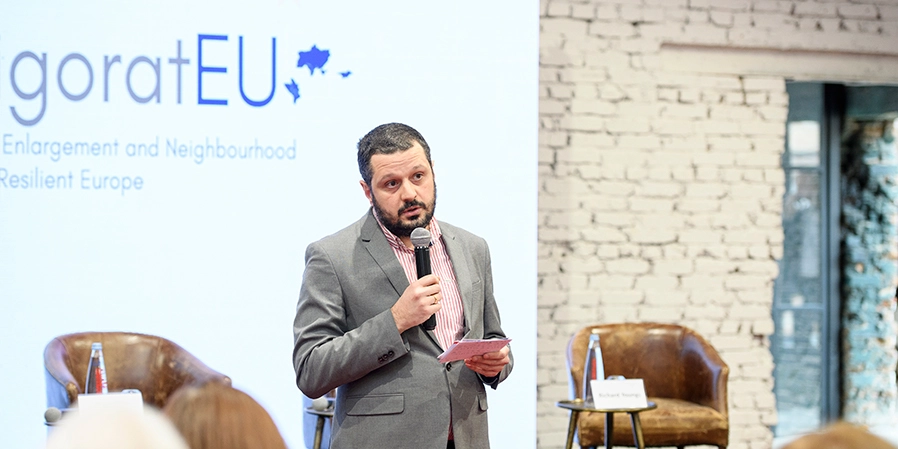
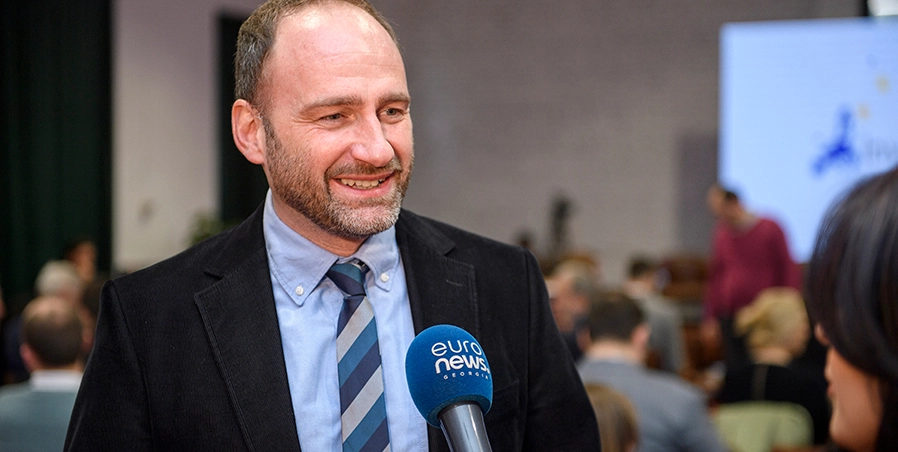
Meanwhile, the first half of the second day of the conference focused largely on the project’s three Working Blocks, encompassing methodologies, forward-looking visions, toolkits and various other central components of “InvigoratEU.”
The concluding stage saw perhaps the most interactive element of the conference, with two panel discussions eliciting some insightful and productive debate.
The first panel, moderated by Prof. Dr. Tekin, was dubbed “How to reform the EU’s enlargement policy in a new geopolitical phase.”
Therein, key contributions were made by Dr. Giselle Bosse (Maastricht University, Netherlands), Mathieu Bousquet (DG NEAR A, European Commission, Belgium), Teimuraz Janjalia (Ministry of Foreign Affairs, Georgia), Iryna Kosse (Institute for Economic Research and Policy Consulting, Ukraine), and Prof. Dr. Frank Schimmelfenning (ETH Zurich, Switzerland).
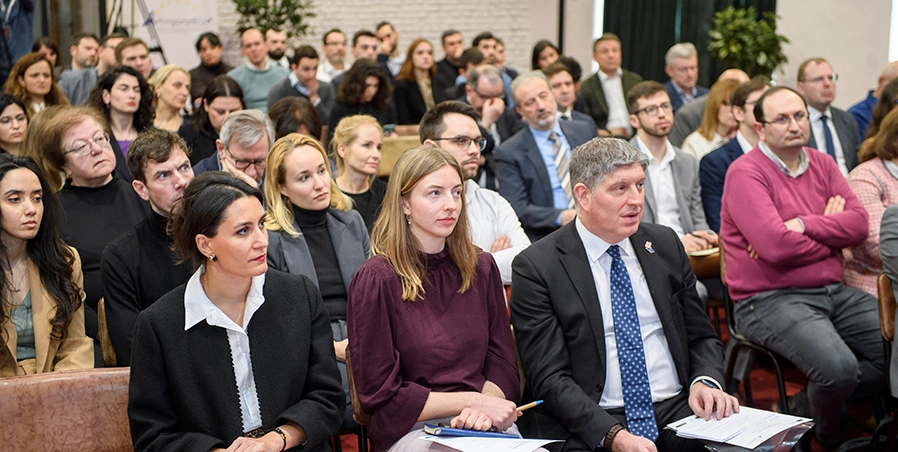
In the wake of the first panel discussion, the second swiftly ensued under the title “Geopolitical challenges and opportunities for the EU and the Western Balkans, Georgia, Ukraine and Moldova,” moderated by Prof. Dr. Richard Youngs (Carnegie Europe, Belgium).
Again, the discussion brought an array of valuable insights from a panel comprising Dr. Matteo Bonomi (Instituto Affari Internazionali, Italy), Gogita Gvedashvili (Georgian Center for Strategy and Development), Dr. Karlis Bukovskis (Finnish Institute of International Affairs, Finland), and Tamara Tsuleiskiri (Information Center on NATO and EU, Georgia).
Following concluding remarks by Victor Burguete (Barcelona Centre for International Affairs, Spain) and Prof. Dr. Kaeding, a reception was held at the Presidential Residence in Tbilisi, hosted by Salome Zourabichvili, President of Georgia.
“This project is very important and timelier than I can say because that is the issue today, enlargement, yes, but how, what for and what this enlargement is going to give to Europe at the time when challenges are increasing on all sides,” noted Salome Zourabichvili, President of Georgia.
PMC Research Engaging in the “InvigoratEU” Project
PMC Research, as part of a consortium led by the University of Duisburg-Essen, is implementing this project alongside 17 leading European and non-European Research organizations.
As a lead partner of two of the project’s working packages, PMC Research, in addition to helping to stage and host the kick-off conference, is also carrying out a social cohesion analysis of the effects of the EU accession process on socio-economic inequality and cohesion in candidate countries.
Elsewhere, PMC Research is also conducting various assignments under the following categories: “Innovative Perspectives on Democratisation in Contexts of Contested Theory,” “Acquis Compliance in the Accession Process,” “Geopolitical Ambitions in View of External Actors,” and “Critical Infrastructures in View of Connectivity and Interdependences.”
New Horizon Europe Project – “InvigoratEU”
Run by a consortium given EUR 3 million and scheduled to last three years, the project pulls together the substantial expertise of 50 researchers from both EU member states and non-EU countries.
Key questions that the project seeks to answer are: “How can the EU strengthen its enlargement and neighborhood policy?” and “Can the EU ensure Europe’s future resilience beyond its borders?”
With that in mind, it pursues the following three key objectives: “New strategies for a strong Europe” – covering how best to react to the military and economic ambitions of Russia, China, the US, and Turkey; “Development of a future-oriented vision” – under which it is hoped that young Europeans will devise policy recommendations for European and national political actors; and “Broad communication of the results” – whereby the recommendations established will be communicated, disseminated, and utilized swiftly.